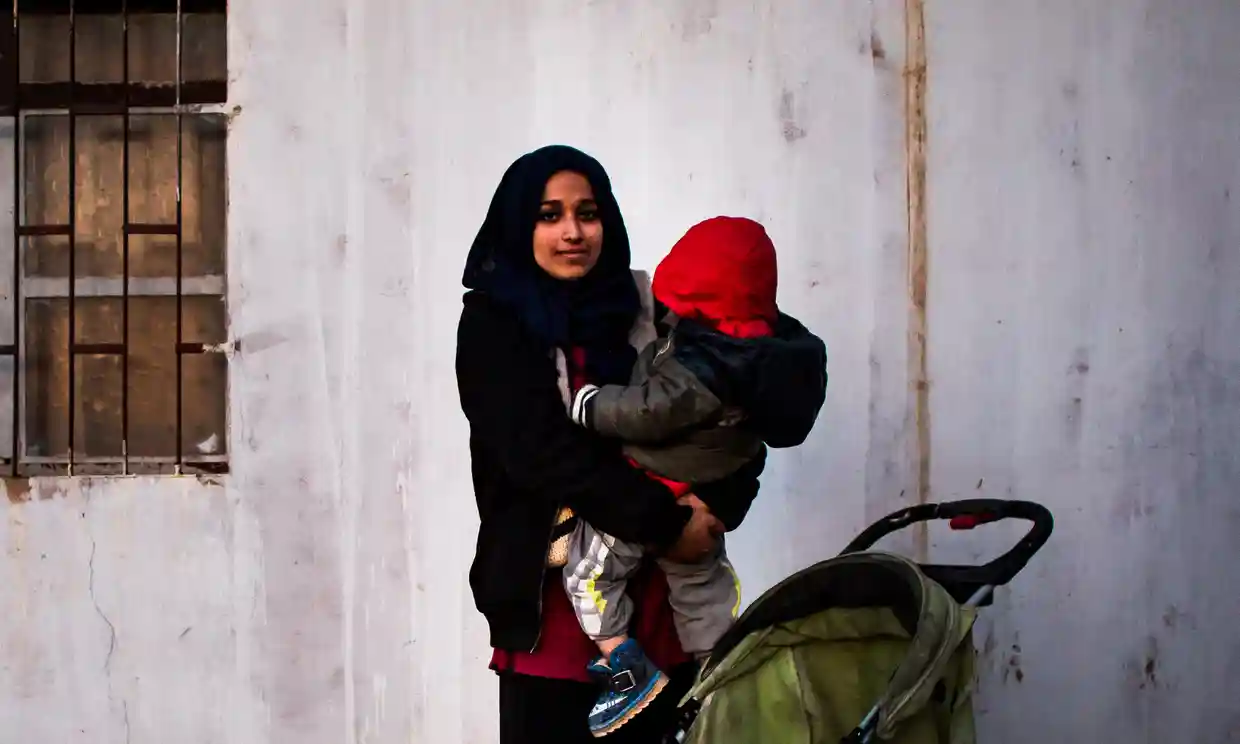Hoda Muthana poses for a portrait with her son Adam in 2019.
Hoda Muthana poses for a portrait with her son Adam in 2019. Her US citizenship was revoked by the Obama administration in 2016. Photograph: Achilleas Zavallis/The Guardian
Oliver Laughland and agencies
Mon 9 Jan 2023 11.12 EST
Last modified on Mon 9 Jan 2023 11.42 EST
A woman who ran away from home in Alabama at the age of 20, joined the Islamic State group and had a child with one of its fighters says she still hopes to return to the United States, serve prison time if necessary, and advocate against extremism.
Speaking from the Roj detention camp in Syria, where she is detained by US-allied Kurdish forces, Hoda Muthana said she was brainwashed by online traffickers into joining the group in 2014 and regrets everything except her young son.
“If I need to sit in prison, and do my time, I will do it … I won’t fight against it,” the 28-year-old told The News Movement. “I’m hoping my government looks at me as someone young at the time and naive.”
It is a line she has repeated in various media interviews since fleeing from one of the extremist group’s last enclaves in Syria in early 2019.
But four years earlier, at the height of the extremists’ power, she had voiced enthusiastic support for them on social media and in an interview with BuzzFeed News. .
In her latest interview, with TNM, Muthana now says her phone was taken from her and that the tweets were sent by IS supporters.
Hoda Muthana.
Hoda Muthana. Photograph: Hoda Muthana/AP
Muthana was born in New Jersey to Yemeni immigrants and once had a US passport. She was raised in Hoover, Alabama. In 2014, she told her family she was going on a school trip but fled to Syria instead .
The Obama administration cancelled her citizenship in 2016, saying her father was an accredited Yemeni diplomat at the time she was born – a rare revocation of birthright citizenship. Her lawyers have disputed that move, arguing that the father’s diplomatic accreditation ended before she was born.
The Trump administration maintained the stance and barred her from returning. US courts have sided with the government and last January the supreme court declined to consider her lawsuit seeking re-entry.
That has left her and her son languishing in a detention camp in northern Syria housing thousands of widows of Islamic State fighters and their children.
Some 65,600 suspected Islamic State members and their families are held in camps and prisons in north-eastern Syria , according to a Human Rights Watch report released last month.
The rights group described “life-threatening conditions” at the camps where inmates include more than 37,400 foreigners, among them Europeans and North Americans.
Human Rights Watch and other monitors have cited dire living conditions in the camps, including inadequate food, water and medical care, as well as the physical and sexual abuse of inmates.
“None of the foreigners have been brought before a judicial authority … to determine the necessity and legality of their detention, making their captivity arbitrary and unlawful,” Human Rights Watch wrote.
Calls to repatriate the detainees were largely ignored in the immediate aftermath of IS’s bloody rule, but with the passage of time, the pace of repatriations has started to pick up.
The US has repatriated a total of 39 American nationals. It is unclear how many other Americans remain in the camps.
Speaking with TNM, Muthana describes how, after arriving in Syria in 2014, she was detained in a guest house reserved for unmarried women and children. The only way to escape was to marry a fighter. She eventually married and remarried three times. Her first two husbands were killed in battle.
The extremist group, which is also known as Isis, no longer controls territory in Syria or Iraq but continues to carry out sporadic attacks and has supporters in the camps. Muthana says she still has to watch what she says, fearing reprisals.
“Even here, right now, I can’t fully say everything I want to say,” she said. “I wish I can help the victims of Isis in the west understand that someone like me is not part of it, that I as well am a victim of Isis.”
Hassan Shibly, an attorney who has assisted Muthana’s family, said it was “absolutely clear that she was brainwashed and taken advantage of”.
He said her family wishes she could come back, pay her debt to society and then help others from “falling into the dark path that she was led down”.

